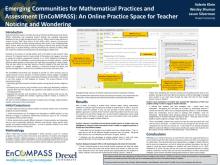Noticing important aspects of student work (e.g. Professional Noticing (van Es & Sherin, 2002)), interpreting and evaluating student thinking and providing high-quality feedback are seen as high leverage practices and are “likely to lead to large advances in student learning” (Ball, Sleep, Boerst, & Bass, 2009, p.461). However, improving the quality and efficiency of these noticing practices often proves to be challenging (Ball, 2001). Further, while the value of teachers working to improve their practice through explicit focus on student thinking is well documented (Levin, Hammer, & Coffey, 2009), few models for professional development and technological scaffolds exist.
We will provide an overview of the online EnCoMPASS environment, share our current activities, and present emerging results from our work with teachers. Specifically, we will describe the EnCoMPASS environment, a tool that was designed to provide an online practice space for teachers that supports focused attention to student problem solving; authentic, thoughtful interpretation of student mathematical thinking; and ultimately a mechanism to use that analysis to develop feedback for students. We will discuss the primary features of the environment, including:
• identifying significant excerpts of student problem solving (words, phrases, diagrams, etc.)
• annotating these excerpts using the Math Forum’s Noticing & Wondering scaffold to describe both why the utterance was significant and aspects that were unclear or emerging questions
• organizing the excerpts and annotations into a folder structure that can be pre-populated or emergent (for example, organizing students’ excepts as evidence of particular strategies).
We will also discuss the underlying design conjectures and rationale for the current features as well as how these emerged over the past three years through work with teachers. This work included cycles of design, implementation, analysis, and revision of the environment. We will share current project challenges, including generating teacher buy-in through building out features that more explicitly connect with their daily challenges – such as using the work in the environment for developing and sending individualized feedback to students and tracking student growth over time.
Finally, we will present results of our analysis on teachers’ individual and collaborative work in the EnCoMPASS environment to date. Using both interview data and archived data from teachers work within the environment, we will demonstrate how specific features support teachers to think reflectively about their students’ work and how they might support those students in new ways. For example, while teachers often flip through students’ assignments, one teacher described how the online environment “acted as a record of what I thought as I did the first read-through of each student’s solution.” Another explained how using the environment supported the development of “a method of thinking for the mentor to generate careful thoughts about minute details within a solution,” and referred to the importance of these details in her teaching. Both of these cases support the notion that teachers were enabled to slow down the process of analysis of student thinking and feedback and focus explicitly on noticing, interpreting and providing feedback in ways that can improve their practice.
